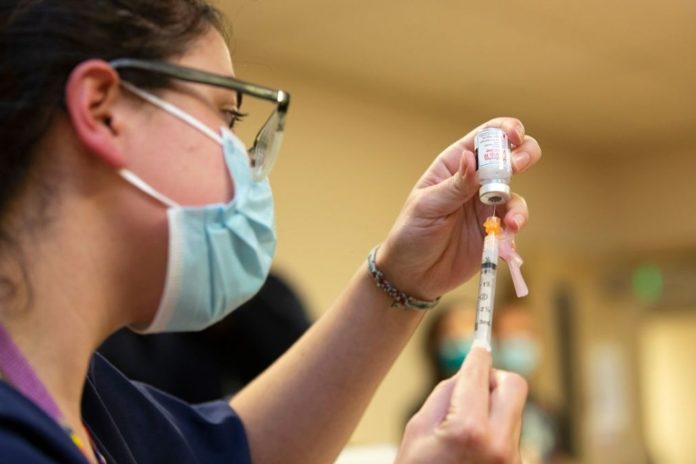A new US research suggests that antibodies against COVID-19 are enhanced after a breakthrough infection – infections that develop after being fully vaccinated – even though the symptoms of these infections are generally mild.
Blood serum from persons who had Delta breakthrough infections exhibited antibodies that were more potent against Delta than blood serum from people who had the original Wuhan strain, suggesting that developing boosters suited to emerging variants could help broaden our protective immune response.
Breakthrough infections following SARSCoV-2 vaccine are becoming more common, possibly due to declining vaccine-induced antibody levels. Additionally, most new cases are caused by developing variants of concern with reduced sensitivity to vaccine-induced antibodies. Antibody levels after conventional vaccination techniques have been utilized in studies to determine the rate of vaccine breakthrough. After a breakthrough infection, the team measured antibody levels and variant cross-neutralization.
Between January 31, 2021, and August 18, 2021, fully vaccinated health care professionals who were later diagnosed with SARS-CoV-2 breakthrough infection based on a positive polymerase chain reaction (PCR) test result were progressively recruited at Oregon Health & Science University. Only those who had never been infected before and who tested negative for nucleocapsid antibodies were included. Controls were fully vaccinated people without a breakthrough infection who were matched on sex, age, vaccination dosage intervals, and time between sample collection and most recent antigen exposure (PCR confirmation for those with breakthrough infection and final vaccine dose for controls).
SARS-CoV-2 variant identification was determined using full-length viral genomic sequencing. Serum dilution titers were evaluated using enzyme-linked immunosorbent assays with a 50 percent effective concentration (EC50) of IgG, IgA, and IgM antibodies specific to the SARS-CoV-2 spike receptor-binding domain. 50 percent focus reduction neutralization tests (FRNT50) were used to determine live SARS-CoV-2 neutralizing serum dilution titers against isolates of the original SARS-CoV-2 strain (WA1) and variations of concern (Alpha, Beta, Gamma, and Delta).
The Wilcoxon matched-pairs signed-rank test with the Holm-dák correction was used to compare the median breakthrough and control sera values in GraphPad Prism. The Kruskal-Wallis test with Dunn correction was used to compare Delta- and WA1-neutralizing titers for sequenceconfirmed Delta variant breakthrough cases, non-Delta breakthrough cases, and controls to evaluate Delta-neutralizing potency. Two-tailed P.05. was used to determine statistical significance.
Twenty-six participants with breakthrough infections (mean age 38 years; 20 [77 percent] women; 24 [92 percent] were vaccinated with BNT162b2, sampled a median 28 days after PCR date and 213.5 days after final vaccination; 21 [81 percent] with mild symptoms) were matched to 26 controls (mean age 38 years; 20 [77 percent] women; 24 [92 percent] were vaccinated with BNT162b2, sampled a median 28 days after (mean age, 39 years; 21 [81 percent ] women; 26 [100 percent ] were vaccinated with BNT162b2, sampled a median 28 days after final vaccination).
In patients with breakthrough infection, total receptor-binding domain–specific immunoglobulin rose with a median EC50 of 2152 (95 percent CI, 961-3596) compared to 668 (95 percent CI, 473-892) in controls (322 percent increase; P.001). Both IgG and IgA serum dilutions rose in the median. After breakthrough infection, the median IgA EC50 was 120 (95 percent CI, 44-246), compared to 24 (95 percent CI, 24-24) for controls (502 percent increase; P.001). There were no significant differences in IgM levels across the groups.
There were ten Delta infections and nine non-Delta infections among the sequence-confirmed breakthrough cases. The median FRNT50 against WA1 in breakthrough cases was 4646 (95 percent CI, 2283-7053), compared to 489 (95 percent CI, 272-822) in controls (950 percent increase; P.001). Figure 2A shows the FRNT50 results for the Alpha, Beta, and Gamma variants. The median FRNT50 against the Delta variant in breakthrough cases was 2482 (95 percent confidence interval: 1072-4923), compared to 243 (95 percent confidence interval: 118-336) in controls (1021 percent increase; P.001) (Figure 2A). Sera from Delta breakthrough patients had higher efficacy against the Delta variant, with each participant neutralizing WA1 at 99 percent (95 percent CI, 73-151) compared to 36 percent (95 percent CI, 33-52) for non-Delta cases and 41 percent (95 percent CI, 24-56) for controls.
Conclusion
Despite the fact that the disease was mostly mild, the results of this study demonstrated a significant boost in humoral immunity after a breakthrough infection. Boosting was more noticeable for IgA, which could be related to changes in exposure routes between vaccination and spontaneous infection.
Furthermore, breakthrough sera showed improved variant crossneutralization, and Delta breakthrough infections, in particular, showed improved potency against Delta vs WA1, implying that the protective immune response could be broadened by developing variant boosters with antigenic inserts matching the emerging SARS-CoV-2 variants.
The study’s limitations include the small number of samples and the time gap between the breakthrough and control groups from initial vaccination to serum collection, which growing evidence suggests may contribute to the formation of variant cross-neutralizing antibody responses.
Source: 10.1001/jama.2021.22898
Image Credit: GEtty
You were reading: Breakthrough infections boost COVID-19 antibodies even if symptoms are mild
